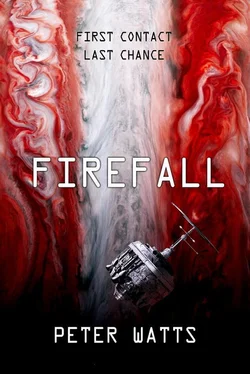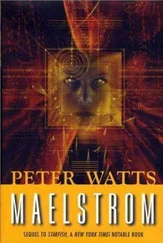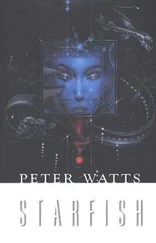He didn’t seem to be entirely in the room. Brüks softly cleared his throat.
Moore blinked and came back. “That’s all we know, really. The telemetry was noisy at best—that dwarf has one mother of a magnetic field, shouts over anything you try to send out. The Bicamerals have some amazing extraction algorithms, they were squeezing data out of clips I swore were nothing but static. But there are limits. Theseus went in and it was like, like watching a ship vanish into a fog bank. For all we know she could still be sending—they left a relay sat behind at least. It’s still active. As long as there’s hope, we’ll keep the feed going. But we’re not getting anything back from the ship itself. Can’t even get a signal through that soup.”
“Except you’re getting a signal right now, you said. Coming in along—”
“No.” Moore held up his hand. “If the system was operating normally we’d have seen it operating, and we didn’t. No handshaking protocols, no explicit transmissions, nobody from up there telling us they were sending something down here . None of the usual bells that are supposed to go off when a package arrives. At most we got a little hiccup that suggests that something might have started coming down, but the checksums didn’t pass muster so move along folks, nothing to see here. Mission Control didn’t even notice it. I didn’t notice it. Wasn’t until the Bicamerals helped me squeeze the archives through their born-again algorithms that I clued in, years after the fact.”
“But if the stream isn’t even running its own protocols, how can it be—”
“Ask them.” Moore jerked his chin toward a vague point beyond the bulkhead, some nexus of Bicameral insight. “I’m just along for the ride.”
“So, something’s using our telematter stream,” Brüks said.
“Or was, at least.”
“And it’s not us.”
“And whatever it is, it’s gone to great lengths to stay off the ’scope.”
“What would it be sending?”
“ The Angels of the Asteroids .” Moore shrugged. “That’s what the Bicamerals are calling it, or at least that’s our closest approximation. Probably just their idea of an op code. But I don’t know if they really think anything’s down there. Maybe it’s just a glitch after all. Or some kind of long-distance hack that didn’t work out, and we can learn something about the hackers by studying their footprints.”
“Suppose there is something down there, though,” Brüks said. “Something—physical.”
Moore spread his hands. “Like what? A clandestine mist of dissociated atoms?”
“I don’t know. Something that breaks the rules.”
“Well,” Moore said, “in that case, I suppose…”
He took a breath.
“It’s had a few years to settle in.”
THINGS FALL APART.
—WILLIAM BUTLER YEATS
THEY’D COME UP with this really great plan to keep their mysterious pursuers from blowing up the Crown : they were going to blow it up themselves first.
They hadn’t asked Brüks for his input.
Now he was back in Maintenance & Repair, taping himself up with another rubbery exoskeleton. It was easy enough to lay down the bands; all he had to do was follow the denuded template he’d stripped into existence less than two days before.
Of course, by now there were no days left to while away. Judging by the chime that had just sounded, he only had about two minutes to burn.
Two minutes to burn .
Lianna dropped out of the ceiling. “Hey. Just so you know, Rak’s about ready to fold down the spokes. Didn’t want you falling over when the gravity shifted.”
Yeah, always concerned about the roaches, Brüks reflected wryly . That sounds just like Rakshi Sengupta.
On cue, the bulkheads shivered. The hab trembled with the sudden faint roar of a distant ocean. A squeezebulb rolled a few centimeters along the cube where someone had left it.
Brüks swallowed. His knitting ankle itched maddeningly. He resisted the urge to scratch; it wouldn’t help anyway, not through the cast.
“Nothing to worry about,” Lianna assured him. “Right-side up goes out of whack by a couple of degrees for a couple of minutes. Not even enough to spill your drink. If you were drinking.”
He wished he was.
Down edged out from between his feet like a lazy pendulum, came to rest half a meter off his centerline: the Crown ’s hollow bones folding back along the spine like the ribs of a closing umbrella, the spin that threw them out slowing in a precise and delicate handoff to acceleration building from behind . All those thousands of tonnes in slow motion, all those vectors playing one against another, and Brüks could feel nothing but a brief polite disagreement between his inner ears. Even now, down was edging back to where it belonged.
It really was pretty impressive, he decided. Still: “It’s not the burn that bothers me. It’s the coma afterward.”
“You won’t even feel it.”
“That’s what I mean. If I’m going to fall into the sun I’d at least like to be awake enough to jump into an escape pod if things go south.”
“Then you’ve got nothing to worry about. No escape pods.”
The hab jumped a bit, to the solid omnipresent thud of great docking clamps snapping shut. The ’bulb on the table wobbled back and forth. The Crown of Thorns, tied down and rigged for sail.
She tossed him his jumpsuit, pointed to the ceiling. “Shall we go?”
No effortless sail through a tunnel of light this time. No easing ascent from pseudograv into free fall. The Crown was on fire now, engines alight, habs flattened back against her flanks; there was no escape from mass-times-acceleration. Every rung ascended left him as heavy as the last, each hoop of hazard tape left him with that much farther to fall.
For some reason he couldn’t identify, that almost made it easier.
They emerged into the Hub, into the bottom of a bowl: a place as gravity-bound now as any other on the ship. The great iris at the south pole was fixed and dilated. Needles of mercury drooled from the mirrorball above like strings of gluey saliva, descending through the open pupil. Freight elevator, apparently. To the Hold, and maybe beyond: to cubbies and crawlspaces where circuits could be wrestled manually in the event of some catastrophic systems failure; to the colossal neutron-spewing engines themselves.
Brüks edged forward and leaned over the railing. The depths of the Crown ’s hollow spine receded like an optical illusion, like God’s own trachea. (Only a hundred meters, Brüks reminded himself. Only . A hundred meters.) Signs of activity down there: flickers of motion, the faint clank of metal on metal. Liquid mirror-ropes vibrating like bowstrings in response to whatever tugged at their ends.
He jumped at a touch on his shoulder. Lianna held two lengths of silver cord in her hand; a stirrup had miraculously opened at the end of each, like hypertrophic needle’s eyes. She handed him one line, pointed her foot through the loop in the other. “Grab and jump,” she said, stepping lightly onto the guardrail.
She dropped away in slow motion—under a quarter-gee burn they weighed even less than under spin—and picked up speed with distance. Brüks hooked his own foot, grabbed his line with one hand (like wrapping your fingers around glassy rubber), and followed her down. The filament stretched and thinned in his grip as he descended. He raised his eyes and thought he might have glimpsed tiny shock waves rippling out from the point at which this miracle cord extruded from the mirrorball’s surface; but speed and distance robbed him of a second look.
Читать дальше








